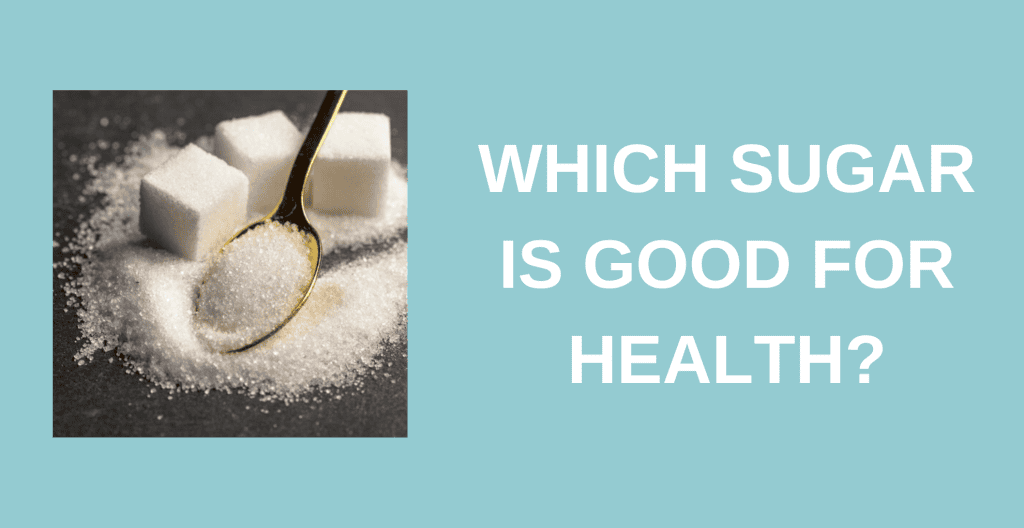When aiming to shed pounds, which sugar is good for weight loss? The type of sugar you eat can significantly impact your weight loss efforts. Whole foods like fruits and vegetables include natural sugars, which are generally healthier for you. These sweets contain fiber, antioxidants, and other nutrients supporting healthy weight management. Refined sugars, on the other hand, can raise your blood sugar levels quickly, followed by crashes that make you feel drained and want more sweets. Natural sweeteners like honey, maple syrup, or stevia can help you get rid of your sweet tooth while also providing a few health advantages; refined sugars should be replaced with these alternatives. When it comes to maintaining a healthy diet, one often wonders, Which sugar is good for health? You can better support your weight loss by selecting the proper kinds of sweets and combining them with a healthy diet and frequent exercise.
Added vs Natural sugar: Which is better?
It’s essential to know the difference between natural and added sugars when trying to lose weight, discussions on sugar alternatives often revolve around the question: Which sugar is good for health? Natural sugars, which are present in whole foods like fruits, vegetables, and dairy products, are packed with vital nutrients, fiber, and antioxidants that improve general health and balance energy and digestion. Because these sugars absorb more slowly, no blood sugar spikes cause overindulgence or increased hunger. On the other hand, added sugars, present in processed foods and beverages with added sweetness, have little nutritional value and can quickly raise and lower blood sugar levels. These swings might increase the difficulty of losing weight by causing cravings and overeating. Health enthusiasts often inquire about which sugar is good for weight loss. Natural sugars are better than added sugars for weight loss and improved health. There are some evening snacks which will help you to maintain your weight and keep you full.
Types of sugar
Knowing the different kinds of sugar may allow you to make better decisions, particularly if you’re trying to reduce weight. The question arises among those on a weight loss journey: which sugar is good for weight loss? These are explanations of the different kinds of sugar, along with in-depth information about their nutritional value, advantages, and possible health risks. Reducing sugar content in diet can help you get an answer to How many calories should i eat in a week?
1. Raw and Unrefined Sugar
Less processing is done on raw and unrefined sugars, which means that more of the minerals and natural molasses from sugarcane are still present. Compared to refined white sugar, these sugars usually have a deeper flavor and a darker color. In terms of nutrition, raw sugars are depleted of minerals like calcium, iron, and potassium throughout the refining process. Because it contains these trace elements, raw sugar is marginally superior to refined sugar; but, because it is high in calories and can cause weight gain if overindulged, it should still be consumed in moderation. Here are some Zero Calorie Foods that help in fast weight loss.
- Nutritional Value: During the refining process, minerals like calcium, iron, and potassium that are present in trace levels are removed from raw sugar.
- Benefits: Raw sugar may be more nutrient-dense than refined white sugar because of these trace minerals. Because of its deeper flavor, you may need to use less of it in recipes.
- Health Risks: Raw sugar has few nutritional advantages, but it is still heavy in calories and, if ingested in excess, can lead to weight gain and other health problems. It may cause blood sugar surges, which may increase the risk of type 2 diabetes and insulin resistance.
2. Brown Sugar
Brown sugar gets its unique flavor and color from adding molasses to white sugar. Depending on the amount of molasses, brown sugar is available in two primary varieties: light and dark. Here are some details on its nutritional worth, advantages, and potential health risks to find answers that is brown sugar good for health.
- Nutritional Value: Because brown sugar has molasses, it has a slightly higher mineral content than white sugar. Some of the minerals it contains are calcium, potassium, iron, and magnesium in trace amounts. However, these levels are insufficient to have a meaningful impact on health.
- Benefits: Brown sugar has a modest nutritional advantage over white sugar due to the trace amounts of minerals it contains. Additionally, because of its deeper flavor, it can improve the flavor of some foods and cut down on the amount called for in recipes.
- Health Risks: Brown sugar has few nutritional benefits, but it still contains many calories and might cause weight gain if ingested in excess. Due to its high glycemic index, it raises the risk of insulin resistance, type 2 diabetes, and other metabolic problems by causing blood sugar increases. Hop on to find out how many calories should i burn a week.
3. Palm Sugar
Which sugar is good for health? This is a common question among health-conscious individuals. Palm sugar can be helpful in managing weight. The sap of several palm tree species, including date and coconut palms, is used to make palm sugar. It is commended for having a lower glycemic index than ordinary sugar and is frequently used as a natural sweetener.
- Nutritional Value: Palm sugar contains potassium, magnesium, zinc, and iron, as well as antioxidants and a few B vitamins.
- Benefits: Palm sugar is a superior choice for preserving stable blood sugar and energy levels because of its lower glycemic index, which results in a slower, more gradual rise in blood sugar levels. Compared to processed sugars, it offers significant health benefits due to its high nutritional content.
- Health Risks: Although palm sugar has nutritional advantages, it is still a sugar and should be used carefully. Like other sweets, excessive consumption can result in weight gain, dental damage, and a higher chance of metabolic disorders.
How Excessive Sugar Impacts Your Health
Sugar consumption in excess can harm your health in several ways. Because sugary meals and drinks are frequently high in calories but poor in essential nutrients, consuming a lot of sugar is associated with weight gain and obesity. Consuming too much sugar raises your risk of type 2 diabetes by causing insulin resistance, a disease in which your cells don’t react to insulin as intended. In addition, it can increase blood pressure and contribute to inflammation, both risk factors for heart disease. Furthermore, consuming a lot of sugar can lead to dental issues like tooth decay and cavities because it feeds dangerous bacteria in the mouth; nutritionists often advise on which sugar is good for weight loss. Furthermore, overeating sugar can cause frequent blood sugar spikes and crashes, which can cause cravings and energy swings that make it more challenging to stick to a balanced diet and lose weight. Also, find the answer to your doubt of, how many calories can walking 1000 steps burn?
Alternatives To Replace Sugar In Your Diet
Those embarking on a weight loss journey often start by asking, which sugar is good for weight loss? There are a number of natural substitutes for sugar that may be healthier when trying to reduce sugar consumption for weight reduction. Also, you can follow a 7 days weight loss diet plan for fast weight loss results. Which sugar is good for health? While all sugars should be consumed in moderation, those with lower glycemic indexes, like coconut sugar, are often favored. Here are a few well-liked sugar alternatives, along with information on their nutritional value and advantages:
1. Stevia
- Nutritional Content: Stevia is a natural sweetener made from the stevia plant leaves. It is free of calories and carbohydrates.
- Benefits: Stevia is considerably sweeter than sugar, so a little goes a long way. It is a good choice for people with diabetes and those attempting to control their weight because it does not affect blood sugar levels. Potential health advantages of stevia include lowered blood pressure and enhanced insulin sensitivity.
2. Coconut Sugar
- Nutritional Content: Made from the sap of coconut palm trees, coconut sugar has trace levels of iron, zinc, calcium, and potassium, among other vitamins and minerals. Additionally, it contains a trace quantity of inulin, a type of fiber that might decrease glucose absorption.
- Benefits: Compared to ordinary sugar, coconut sugar has a lower glycemic index, meaning its effects on blood sugar levels are less severe. It offers some vitamins and a deeper flavor similar to brown sugar, which can improve the flavor of recipes.
3. Jaggery
- Nutritional Value: Made from sugarcane juice or palm sap, jaggery is an unprocessed sugar. Some naturally occurring vitamins and minerals, including iron, magnesium, potassium, and phosphorus, are still present. Is jaggery good for weight loss? It depends on factors like portion control and overall dietary choices.
- Benefits: Jaggery nutrition is crucial in traditional diets, providing a wholesome energy source and essential minerals. It is thought to offer digestive advantages, promoting better digestion and preventing constipation. Jaggery is also believed to help the liver become more detoxified by eliminating toxins from the body, and that is how you can use jaggery for weight loss
4. Honey
- Nutritional Value: Bees use floral nectar to make honey, a natural sweetener. It has trace levels of antioxidants, vitamin C, calcium, and iron, among other vitamins and minerals.
- Benefits: Honey’s antibacterial qualities help relieve coughs and sore throats. Because of its antioxidant concentration, the body can be shielded against oxidative damage. Refined sugar has a higher glycemic index than honey, which means that honey releases energy more steadily.
Will no sugar diet helps in weight loss
As part of their wellness journey, individuals frequently research: Which sugar is good for health? The right answer is reducing the amount of sugar in your diet which can significantly aid in weight loss. Eliminating added sugars can significantly lower caloric intake because sugar-filled foods and beverages frequently consume empty calories. Your body is more inclined to use fat reserves for energy when fewer surplus calories are around, which encourages weight loss. People trying to reduce calories often wonder which sugar is good for weight loss. The answer can be eliminating sugar from one’s diet, which not only helps weight loss but also aids in blood sugar stabilization by avoiding insulin surges and crashes, which can worsen appetite and boost desires for sugary foods. This stability may result in less overeating and a more balanced appetite. In addition, cutting back on sugar can enhance metabolic health by lowering insulin resistance, which is frequently associated with weight gain and trouble losing weight. You’ll probably eat more entire foods like fruits, vegetables, lean proteins, and whole grains if you follow a diet low in added sugars. These nutrient-dense meals help you feel fuller for longer and lessen the urge to snack on harmful foods because they contain the vitamins, minerals, and fiber essential for general health and satiety. In conclusion, a sugar-free diet can help with weight loss by reducing caloric intake, regulating blood sugar, enhancing metabolic health, and encouraging better eating habits. Ever wondered How to Lose 1 Kg in a Week? Reducing added sugar might just help find the perfect answer.
No sugar 7 days Diet plan
Embarking on a seven-day no-sugar diet plan can jumpstart your journey to better health. By eliminating added sugars, you’ll reduce cravings, stabilize blood sugar, and discover the natural sweetness of whole foods. This plan focuses on nourishing your body with nutrient-dense meals, supporting your goals for a healthier lifestyle. “Which sugar is good for health?” remains a debated topic among dietitians. Additionally, weight-conscious individuals may seek advice on which sugar is good for weight loss. Get ready for a week of clean eating and revitalization with our carefully crafted no sugar diet plan. You can follow this 8 days weight loss diet plan to see weight loss results.
Day 1:
- Breakfast: Scrambled eggs with spinach and tomatoes.
- Snack: Sliced cucumber and carrot sticks with hummus.
- Lunch: Grilled chicken salad with mixed greens, avocado, and vinaigrette dressing.
- Snack: Greek yogurt with berries.
- Dinner: Baked salmon with roasted asparagus and quinoa.
Day 2:
- Breakfast: Overnight oats made with almond milk chia seeds, and topped with sliced strawberries.
- Snack: Apple slices with almond butter.
- Lunch: Turkey lettuce wraps with avocado, bell peppers, and a squeeze of lime.
- Snack: Celery sticks with guacamole.
- Dinner: Stir-fried tofu with broccoli, bell peppers, and brown rice.
Day 3:
- Breakfast: Smoothie made with spinach, kale, banana, and almond milk.
- Snack: Handful of mixed nuts (unsweetened).
- Lunch: Quinoa salad with black beans, corn, cherry tomatoes, and a squeeze of lemon.
- Snack: Sliced bell peppers with hummus.
- Dinner: Grilled shrimp with zucchini noodles and marinara sauce.
Day 4:
- Breakfast: Greek yogurt parfait with unsweetened granola and fresh berries.
- Snack: Cherry tomatoes with mozzarella cheese.
- Lunch: Chicken and vegetable stir-fry with cauliflower rice.
- Snack: Cottage cheese with sliced cucumber.
- Dinner: Baked cod with steamed broccoli and a side salad.
Day 5:
- Breakfast: Scrambled tofu with sautéed mushrooms and spinach.
- Snack: Edamame beans.
- Lunch: Lentil soup with a side of mixed greens.
- Snack: Almond milk latte (unsweetened).
- Dinner: Grilled steak with roasted Brussels sprouts and sweet potato wedges.
Day 6:
- Breakfast: Avocado toast on whole grain bread with sliced tomatoes.
- Snack: Kale chips.
- Lunch: Tuna salad lettuce wraps with diced celery and onions.
- Snack: Sugar-free popsicle.
- Dinner: Baked chicken thighs with roasted cauliflower and a green salad.
Day 7:
- Breakfast: Vegetable omelette with a side of sliced avocado.
- Snack: Strawberries with whipped coconut cream.
- Lunch: Spinach and feta stuffed bell peppers.
- Snack: Air-popped popcorn (unsalted, no butter).
- Dinner: Grilled vegetable skewers with a side of quinoa.
Remember to drink plenty of water throughout the day and listen to your body’s hunger and fullness. This plan focuses on whole, nutrient-dense foods while avoiding added sugars. 8 weeks diet plan for weight loss to help to achieve your weight loss goals.
Expert Review on “Which sugar is good for health?”
Which sugar is good for health? Many health experts recommend opting for natural sugars; the natural sugars found in fruits, vegetables, and dairy are the finest options for your health. These sugars include fiber and vital nutrients that help you feel full and content. On the other hand, processed foods with added sugars offer empty calories and may cause energy to be sluggish. Understanding which sugar is good for weight loss is essential in pursuing a healthier lifestyle. Keep an eye on the glycemic index – sugars with a low glycemic index, like those in whole fruits and grains, are absorbed slowly, providing steady energy. Moderation is the key to sugar, regardless of the variety you choose. If you’re not cautious, even natural sugars may build up rapidly, so it’s crucial to monitor your total sugar intake and make an effort to cut back on the amount of sugary foods and drinks you consume. In the pursuit of wellness, people frequently inquire: Which sugar is good for health? Recall that there is no general solution to which sugar is good for health . It all comes down to figuring out the ideal ratio for your particular dietary requirements. So enjoy the sweetness of a healthy option and have a piece of fruit or a scoop of yogurt. Your body will appreciate it.
References
- Abayechaw, Desta. “(PDF) Health Benefits and Risk of Sugar Consumption and the Alternative Use of Stevia.” ResearchGate, 5 January 2023, https://www.researchgate.net/publication/369553085_Health_Benefits_and_Risk_of_Sugar_Consumption_and_the_Alternative_Use_of_Stevia. Accessed 25 May 2024.
- “The Impact of Free Sugar on Human Health—A Narrative Review.” NCBI, 10 February 2023, https://www.ncbi.nlm.nih.gov/pmc/articles/PMC9966020/. Accessed 25 May 2024.
- Misra, Varucha. “(PDF) Effect of sugar intake towards human health.” ResearchGate, 28 October 2016, https://www.researchgate.net/publication/309490279_Effect_of_sugar_intake_towards_human_health. Accessed 25 May 2024.
FAQs
1. What is the healthiest type of sugar?
The answer to the query Which sugar is good for health? Is natural whole foods like fruits, vegetables, and dairy products contain the healthiest kind of sugar. These sugars include fiber, vitamins, minerals, and other vital components that promote general health and well-being. Additionally, because of their reduced glycemic index, they offer consistent energy without raising blood sugar levels.
2. Which sugar is good for health, white or brown?
Neither brown sugar nor white sugar has a significant health advantage over the other. Both have comparable nutritional characteristics and are sugars. Moderation and focusing on getting your sugar fix from complete foods like fruits and vegetables are the keys to a healthier diet.
3. Which type of sugar is not harmful?
Natural sugars found in whole foods like fruits and vegetables are not harmful when consumed in moderation. These sugars provide energy without the negative health consequences of added sugars because they are packed with vital nutrients, vitamins, and fiber.
4. What sugar is good for your body?
The body benefits from the natural sugars present in whole foods, including dairy, fruits, and vegetables. Consumed as part of a balanced diet, they offer vital nutrients, vitamins, and fiber that enhance general health and well-being.
5. Is jaggery better than sugar?
Because jaggery is less refined than sugar, it contains some of the minerals found in sugarcane, including potassium, magnesium, and iron. Additionally, compared to refined sugar, it may result in a less severe blood sugar spike because of its lower glycemic index. Because of this, some individuals think jaggery is preferable to sugar, however moderation is still advised while consuming it.
6. Is jaggery good for health?
Jaggery contains minerals like iron, magnesium, and potassium, which can positively affect health. Furthermore, its lower glycemic index might improve blood sugar regulation compared to refined sugar. But as part of a balanced diet, it should be used carefully, just like any other sweetener.
7. Is it okay to eat brown sugar daily?
If you consume brown sugar in moderation each day and maintain a balanced diet, you should be fine. However, you should know how much sugar you consume and not just use brown sugar to make food sweet.
8. Can no sugar diet helps in weight loss?
Definitely cutting out sugar from your diet can help you lose weight since it lowers your overall calorie intake and helps to balance your blood sugar levels, which reduces cravings and decreases your chance of overeating.









